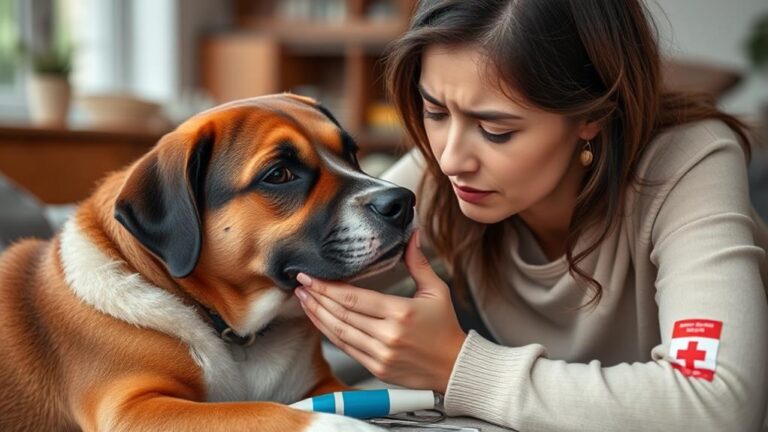When your dog's face is swollen, check for signs of allergic reactions like itchiness or redness. If you suspect allergies, you can give them Benadryl, but make sure to follow the correct dosage. Ice packs can help soothe the swelling, too. Keep an eye on your dog. If the swelling doesn't go down in a day or worsens, you should take them to the vet. This swelling might hint at more serious problems, like infections or injuries. Trust your instincts—if something seems off, it's best to get help. You'll find important tips about this topic next.
Treatment Options for Facial Swelling
When your dog's face swells, swift action and appropriate treatment are essential for recovery.
Start by checking if your pup might be having an allergic reaction. In some cases, your veterinarian may suggest over-the-counter antihistamines, like Benadryl, to help reduce swelling.
It's important to keep in mind that certain medications, such as Pepto Bismol for upset stomachs, can also be considered for other symptoms your dog may experience, but shouldn't be given without veterinary guidance.
If this isn't enough, an antihistamine injection can give faster relief. Nonsteroidal anti-inflammatory drugs, or NSAIDs, can also be used to decrease swelling and pain.
You can apply ice packs or heating pads gently to the affected area to soothe your dog.
If the cause of the swelling is unclear, it's best to take your dog to the vet for a thorough exam, so they can determine the right course of action and proper treatment.
Duration of Facial Swelling
Facial swelling in dogs can appear within minutes or may take a few hours after exposure to an irritant. If your dog's face swells, the duration can vary. It might last 1-2 days if left untreated. In some cases, the swelling might take up to 5-7 days to go away completely. Bruising from the swelling can hang around even longer, taking about 10-14 days to fade. Getting veterinary help right away can help your dog heal faster.
| Duration | Description |
|---|---|
| 30 minutes – 3 hours | Initial swelling time |
| 1 – 2 days | Untreated swelling duration |
| 5 – 7 days | Complete resolution possible |
| 10 – 14 days | Bruising fade time |
| Immediate vet help | May expedite recovery |
Use of Benadryl
Benadryl can be a helpful option for treating your dog's facial swelling, especially if it's caused by allergies. This over-the-counter medication works effectively to reduce itchiness and hives, making it a commonly used remedy among pet owners.
However, it's essential to be aware of the proper dosage and the potential risks involved with overuse, as overdose symptoms and signs can include drowsiness and agitation. The standard dosage is about 1 mg for each pound your dog weighs. For instance, if your dog weighs 20 pounds, you'd give them a 20 mg dose.
But it's important to monitor the dosage carefully since an overdose of Benadryl can be dangerous. Always consult your veterinarian first before giving any medication to your dog. They can provide guidance on whether it's safe and how much to give.
Using Benadryl can help calm the swelling and make your furry friend more comfortable.
Causes of Swelling
Swelling in a dog's face can arise from various causes, each requiring attention. One common cause is an allergic reaction. Dogs can react to these allergens, leading to swelling.
Infections or abscesses can also make the face swell, as the body fights off the germs. Gastric dilatation and volvulus (GDV) is another serious condition that can cause severe swelling and is life-threatening.
Insect bites or stings might trigger swelling as well. Stress can lead to swelling too, as increased cortisol levels affect the body.
If you notice swelling, it's important to check for signs of distress and get help if needed. Knowing these causes helps you understand why your dog's face might be swollen.
Recognizing Allergic Reactions
When your dog experiences an allergic reaction, it's crucial to recognize the symptoms early. You might see itchiness, redness, or hives on their skin. Your dog may also scratch a lot or shake their head.
If the swelling is around their face, it could be serious. Keep an eye on them for a day or two if the symptoms are mild. But if things get worse, you need to act fast. Severe reactions can happen, and your dog may need immediate help.
Always check for common allergens like certain foods, insect bites, or environmental factors. By noticing the signs, you can help your furry friend feel better sooner.
When to Seek Veterinary Help
Recognizing the severity of your dog's condition can be essential in determining whether you need to seek veterinary help.
If your dog's face swells suddenly, it might be an allergic reaction or an injury. Look for signs like difficulty breathing, drooling, or extreme swelling. If you see these warnings, don't wait—call your vet right away.
If the swelling lasts more than a day or worsens, it's also time for a visit. Untreated swelling can lead to bigger problems, like infections.
In some cases, a swollen face may point to a life-threatening issue, such as gastric dilatation. Always trust your instincts; if you're worried, seek help.
Your dog's health is worth it!
Conclusion
To sum up, it's important to keep an eye on your dog's swollen face. If you notice other symptoms or the swelling lasts a long time, it's best to see a vet. You can try giving them Benadryl for minor swelling, but always ask your vet first. By staying alert and acting quickly, you can help your dog feel better and get back to being happy and healthy! Your furry friend needs you to be their best helper.



